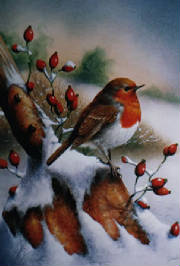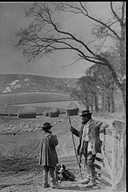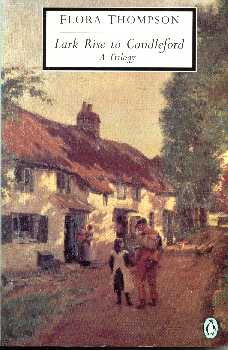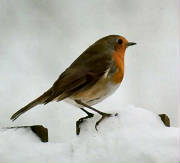|
Christmas Day Passed Very Quietly

Christmas Day passed very quietly. The men had a holiday from work and the children
from school and the churchgoers attended special Christmas services. Mothers who had young children would buy them an orange
each and a handful of nuts; but, except at the end house and the inn, there was no hanging up of stockings, and those who
had no kind elder sister or aunt in service to send them parcels got no Christmas presents.
Still, they did manage to make a little festival of it. Every year the farmer killed
an ox for the purpose and gave each of his men a joint of beef, which duly appeared on the Christmas dinner-table together
with plum pudding - not Christmas pudding, but suet duff with a good sprinkling of raisins. Ivy and other evergreens (it was
not holly country) were hung from the ceiling and over the pictures; a bottle of homemade wine was uncorked, a good fire was
made up, and, with doors and windows closed against the keen, wintry weather, they all settled down by their own firesides
for a kind of super-Sunday. There was little visiting of neighbours and there were no family reunions, for the girls in service
could not be spared at that season, and the few boys who had gone out in the world were mostly serving abroad in the Army.
There were still bands of mummers in some of the larger villages, and village choirs
went carol-singing about the countryside; but none of these came to the hamlet, for they knew the collection to be expected
there would not make it worth their while. A few families, sitting by their own firesides, would sing carols and songs; that,
and more and better food and a better fire that usual, made up their Christmas cheer.
-From, Lark Rise To Candleford by Flora Thompson

Flora Thompson. 1876 - 1947
![Flora Thompson. 1875 -1947[click for larger image]](sitebuildercontent/sitebuilderpictures/florathompson.jpg)
The eldest daughter of Albert and Emma Timms,Flora Jane Thompson was
born in the tiny Oxfordshire hamlet of Juniper Hill, near Brackley, on 5th December 1876. She attended school in the neighbouring
village of Cottisford. After leaving school at fourteen, and moving away from home, for the first time, she worked as a post-office
clerk at the Fringford post-office. After four years she left Fringford, and took a number of short holiday-relief engagements
in various rural post-offices, then applied for and got the job of assistant at the Grayshott post-office, in Hampshire. There,
in due course, she met her future husband John Thompson,himself a post-office-clerk who later became a postmaster. In 1903
John Thompson was transferred to the main post-office in Bournemouth, he and Flora were married and began life together in
this large sea-side town. Flora was then twenty-six.
The Thompsons remained in Bournemouth for thirteen years, during
which time their two elder children, Winifred and Basil, were born. In 1916 they moved to Liphook in Hampshire, and a younger
son, Peter was born a year later. They lived in Liphook for twelve years, until another, and final posting for John Thompson
took them, in 1928, to Dartmouth, where they remained until his retirement in 1940. In the early years she supplemented their
meagre income with journalism, writing nature essays for The Catholic Fireside, the Daily News, The Lady, and other papers,
and in 1921 she published a volume of verse, Bog-myrtle and peat. She is remembered for her autobiographical trilogy Lark
Rise to Candleford (1945), published originally as Lark Rise (1939), Over to Candleford (1941), and Candleford Green (1943),
works which evoke through the childhood memories and youth of third-person 'Laura' a vanished world of agricultural customs
and rural culture. There is a selection of works by Margaret Lane, A Country Calendar and other writings (1979), with a biographical
introduction.
Flora Thompson died on 21 May 1947, and was buried in Dartmouth.
The Oxford Companion to English Literature.
© Margaret Drabble and Oxford University Press. 1995.

The First Page from Lark Rise To Candleford
Lark Rise
1
Poor People's Houses
THE hamlet stood on a gentle rise in the flat, wheat-growing north-east corner of Oxfordshire. We will call it Lark Rise
because of the great number of skylarks which made the surrounding fields their springboard and nested on the bare earth between
the rows of green corn
All around, from every quarter, the stiff, clayey soil of the arable fields crept up; bare, brown
and windswept for eight months out of every twelve. Spring brought a flush of green wheat and there were violets under the
hedges, and pussy-willows out beside the brook at the bottom of the 'Hundred Acres' ; but only for a few weeks in later summer
had the landscape real beauty. Then the ripened cornfields rippled up to the doorsteps of the cottages and the hamlet became
an island in a sea of dark gold.
To a child it seemed that it must always have been so; but ploughing and sowing and reaping
were recent innovations. Old men could remember when the Rise, covered with juniper bushes, stood in the midst of a furzy
heath - common land, which had come under the plough after the passing of the Inclosures Acts. Some of the ancients still
occupied cottages on land which had been ceded to their fathers as 'squatters' rights', and probably all the small plots upon
which the houses stood had originally been so ceded. In the eighteen-eighties the hamlet consisted of about thirty cottages
and an inn, not built in rows, but dotted down anywhere within a more or less circular group. A deeply rutted cart track surrounded
the whole, and separate houses or groups of houses were connected by a network of pathways. Going from one part of the hamlet
to another was called 'going round the Rise' , and the plural of 'house' was not 'houses' , but 'housen' . The only shop was
a general one kept in the back kitchen of the inn. The church and school were in the mother village, a mile and a half away.
A road flattened the circle at one point. It had been cut when the heath was enclosed, for the convenience in fieldwork
and to connect the main Oxford roaed with the mother village and a series of villages beyond. From the hamlet it led on the
one hand to church and school, and on the other to the main road, or the turnpike, as it was still called, and so to the market
town where the Saturday shopping was done.. It brought little traffic past the hamlet. An occasional farm wagon, piled with
sacks or square-cut bundles of hay; a farmer on horseback or in his gig ; the baker's little old white-tiled van; a string
of blanketed hunters with grooms, exercising in the early morning; and only one of the old penny-farthing high bicycles at
rare intervals. People still rushed to their cottage doors to see one of the latter come past.
A few of the houses had
thatched roofs, whitewashed outer walls and diamond-paned windows, but the majority were just stone or brick boxes with blue-slated
roofs. The older houses were relics of pre-enclosure days and were still occupied by descendants of the original squatters,
themselves at that time elderly people. One old couple owned a donkey and cart, which they used to carry their vegetables,
eggs, and honey to the market town and sometimes hired out ar sixpence a day to their neighbours. One house was occupied by
a retired farm ballif, who was reported to have 'well feathered his own nest' during his years of stewardship. Another aged
man owned and worked upon an acre of land. These, the innkeeper, and one other man, a stonemason who walked the three miles
to and from his work in the town every day, were the only ones not employed as agricultural labourers.
![Remember the Land [click for full size image]](sitebuildercontent/sitebuilderpictures/2047.jpg)
|
 |
|

(suet pudding)
 |
 |
![[click for larger image]](sitebuildercontent/sitebuilderpictures/larkrisetocandlefordsoundtrack.jpg)
|
| Charisma CDS 4020 (LP, UK, 1980) |
The Albion Band:
with

The Original Cast:
Laura: Valerie Whittington
Pumpkin: Brian Protheroe
Boamer: Bill Caddick
Jerry Parrish: John Tams
The Vicar: Brian Protheroe
Edmund Timms: Paul Davies-Prowles
Albert, Laura's Father: Brian
Protheroe
Thomas Brown, Postman: Martin Carthy
John,
Laura's Husband: Brian Protheroe
|
|

|
|
Keith Dewhurst transformed the
three books into two plays,
both put on at the
National Theatre, London and
directed by
Bill Bryden and Sebastian Graham-Jones:
Lark Rise in March 1978, and
Candleford in November 1979.
|
|
 |
 |
 |
 |
|
A Poem by Flora Thompson

|
|
This Earthly Paradise
I DESIRE no heaven of gold harps,
Give me the harps of earth--
Pine trees with red gold on their stems,
The music of the west wind in their branches!
When I am old,
Give me for heaven a little house set on a heath;
The blue hills behind; the blue sea before.
The brick floors scoured crimson, the flagstones like snow;
The brass taps and candlesticks like gold,
And there, in my soft grey gown between the holly-hocks,
Upon a day of days I would welcome an old poet;
And pour him tea, and walk on the heath, and talk the sun down;
And then by the wood fire he should read me the poems
of his passionate youth,
And make new ones praising friendship above love!
A web page sponsored by
present-day residents of
Cottisford (Fordlow) and
Juniper Hill (Lark Rise)
who share with many
people round the world
a warm affection for
Flora Thompson as
revealed by her writings.

|
|
 |
 |
|
 |
|
|
 |
|
|
|

